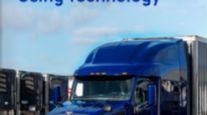Tech Products Shine at Yearly TMC Meeting
This story appears in the March 12 print edition of Transport Topics. Click here to subscribe today.
TAMPA, Fla. — Two of the nation’s largest trailer makers unveiled advancements in their offerings here at the Transportation Technology Exhibition, with Great Dane Trailers focusing on support services and Wabash National Corp. showing off a dry van that behaves like a flatbed.
The exhibition was part of the annual meeting of the Technology & Maintenance Council, a division of American Trucking Associations.
Great Dane is attaching emergency road service to the package of services in its AdvantEdge program. AdvantEdge started a year ago offering access parts and service in North America throughout Great Dane’s network.
Now the company is adding 24-hour repair service for all trailer issues and some tractor problems in a partnership with InterStar North America, said Randy Gosson, a Great Dane sales manager.
Wabash displayed its Duralate XD-35 van, which was built to solve a problem for Nussbaum Transportation in its dealings with shipper Electrolux Appliances. Nussbaum provides the manufacturer with dedicated contract carriage, hauling coils of steel into a plant and finished goods outbound. Flatbeds delivered the metal, but there were no backhauls for the return trips. Dry vans for finished goods could not deliver the bulky coils, Wabash Marketing Director Thomas Rodak said. Nussbaum wanted a trailer that could do both types of work.
The new extra-duty van costs 20% to 30% more than Wabash’s standard DuraPlate van, but it can haul steel coils, rolls of paper and engines. It also can handle a load of 35,000 pounds rolling in on a forklift, Rodak said.
“There are about 2.5 times more cross members on this than a normal trailer and longer side rails,” he said. There are D-rings on the edge of the floor for strapping down the large loads, and the base rail is bolted into place rather than riveted, Rodak said.
Among other displays on the exhibit floor:
• Volvo Trucks is enhancing its menu of ownership support services. Fleets and owner-operators who buy tractors this year will get more services standard as part of the purchase, including ASIST and roadside protection.
The automated service information system, formerly MVASIST, comes standard for anyone buying a truck.
“There had been a subscription fee for it, and 120 to 150 fleet customers took it,” said Volvo Vice President David Pardue. The roadside service runs for two years — or longer if the buyer gets an extended warranty.
Pardue said Web-based ASIST allows fleets and drivers to examine maintenance history and needs for all fleet vehicles from any location in conjunction with Volvo personnel and dealership representatives.
Mack Trucks, a sister company within Volvo Group, is keeping the MVASIST name and offering the services in a similar fashion, Mack said.
• North American truck tires might get better in the next few years, but fleet managers should not expect them to get cheaper, said the chief operating officer of Michelin Americas Truck Tires, Vic Koelsch.
“For more than 10 years, the return on investment in North American truck tires has been one of our least attractive returns at Michelin,” said Koelsch, an Oklahoma
City native who has held the COO post since September, after working for Michelin in France for 10 years.
While Michelin as a whole is investing $2 billion a year for its current five-year investment plan, Koelsch said North American truck tires will not get a lot of that until the business demonstrates better profitability than the current 2% to 4%.
If enhanced profitability is Koelsch’s main financial goal, better low-rolling-resistance tires is his prime objective in terms of product development.
Speaking of the federal rule on carbon emissions and fuel mileage for trucks, Koelsch said that “low rolling resistance is a huge part of it.”
Michelin engineers are trying to make tires that keep a stable, constant footprint in contact with the pavement and run cool. Tires heat up when they waste energy, and then have to dissipate that heat, said Michelin engineer Jim Boyle. Engineers have to balance fuel economy, traction and durability in their designs, and “it’s hard to do all of them,” Boyle said.
Tire Centers Inc., a Michelin subsidiary that sells and maintains truck tires, announced it had won a patent for its Track My Tread tire accounting service. The online service helps fleets track tire use, maintenance and costs.
TCi also is branching out into emergency road service and trailer repairs, said TCi Vice President Nate Kirian.
• Shell Lubricants is working on a new category of engine oil for trucks that could make its debut in four years, just ahead of the 2017 federal regulatory change on greenhouse gas emissions and fuel mileage for heavy- and medium-duty engines. It is currently called Proposed Category (PC) 11.
Dan Arcy, a technical manager for Shell Oil Co., including the U.S. lubricants division, said the proposed oil is not unique to Shell but would be used industrywide.
He said the oil’s properties would be specified by the American Petroleum Institute, with testing procedures certified by ASTM International, formerly the American Society for Testing and Materials.
Arcy said the new oil is being designed to perform better in terms of oxidation stability, aeration, shear stability, compatibility with biodiesel blends and enduring higher temperatures.
• TMW Systems, the Beachwood, Ohio, maker of fleet and transportation management software, has applications for predictive analytics, data warehousing, operations measurement and maintenance activities, said General Manager Mike August.
Some carriers are sopping up excess maintenance shop capacity by working on trucks owned by other fleets, August said, adding that TMW can help manage the side business. He also said tablets equipped with TMW software can help drivers complete pre- and post-trip vehicle inspection reports.
August said the predictive analytics program can help a carrier estimate how adding or subtracting tractors, trailers and other inputs would affect operations.
The company also offers data warehousing, with “dashboards” that provide quick summaries of frequently requested management statistics and then guide the user on how to get more information from the company’s database.
• EZ Claw Inc., Charlotte, N.C., makes hardware assemblies for managing brake air hoses and electrical cables, often referred to as “glad hands.” The cables emerge from the back of the tractor so they can attach to the front of the trailer when the two are hooked together.
Company President Tom Getts described EZ Claw as a “no touch” system for maintaining and protecting a gladhands assembly. He said it will handle up to 90 inches of hoses and cables to prevent entanglement, chafing and damage from road debris.




